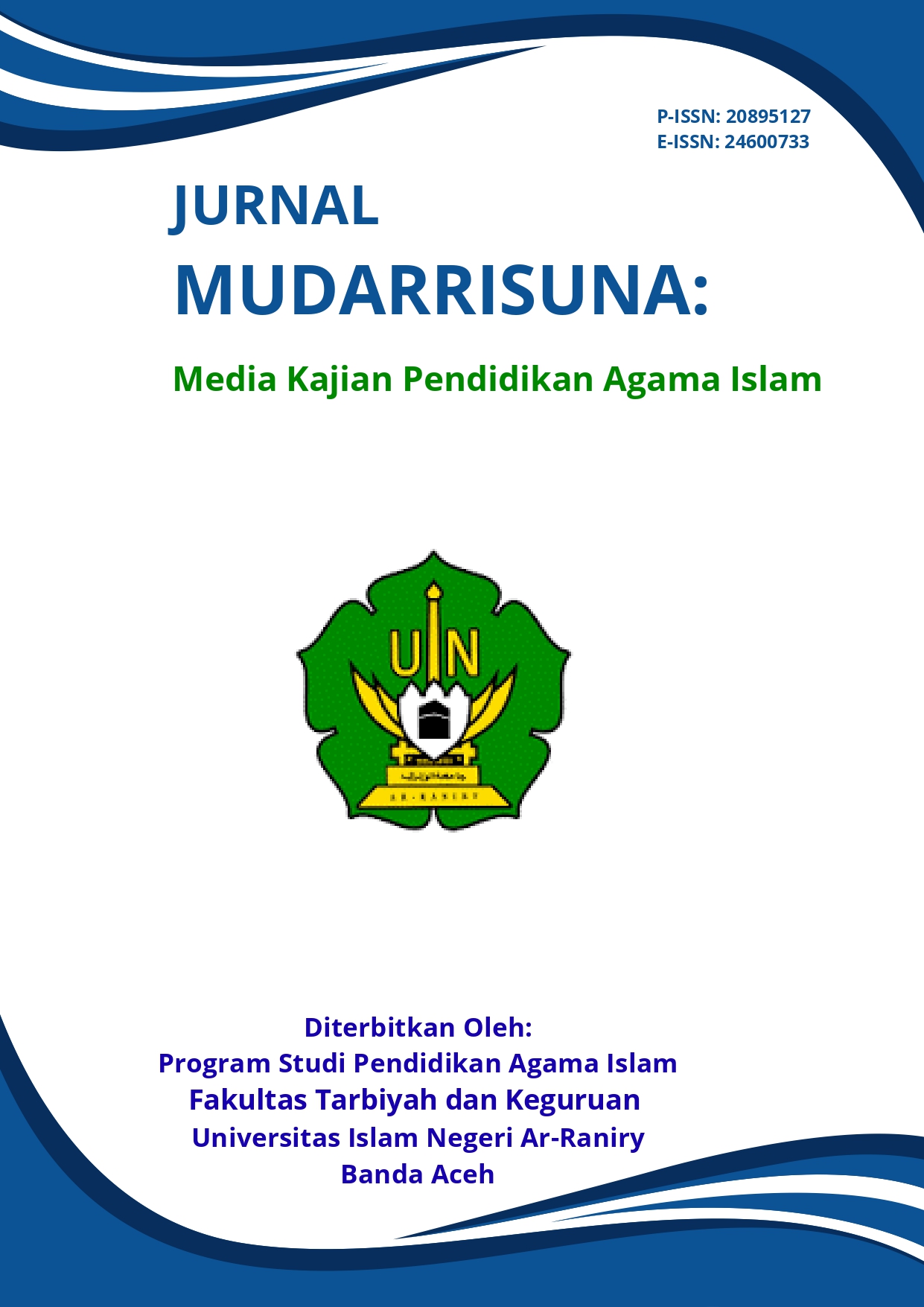BUILDING HUMANISTIC EDUCATION IN LEARNING: IMPLEMENTATION OF THE CONCEPT OF TEACHER PERSONALITY ACCORDING TO AL-ZARNUJI
DOI:
https://doi.org/10.22373/j5y83p86Keywords:
Teacher personality, Al-Zarnuji, humanist education, student characterAbstract
This study discusses the concept of teacher personality according to Al-Zarnuji and its relevance in building humanistic and inclusive education in learning. Al-Zarnuji identified six main characteristics that a teacher must have, namely sincere intentions, compassion, consistency in learning, avoiding envy, avoiding conflict, and avoiding hostility. These characteristics are an important foundation in forming a conducive learning environment and increasing student learning motivation. This study uses a qualitative approach with a descriptive-analytical method through a literature study of the book Ta'lim al-Muta'allim and contemporary Islamic education literature. The results of the study show that teacher personality has a significant impact on the formation of student character, especially in moral, social, and intellectual aspects. In the context of modern education, Al-Zarnuji's concept remains relevant to face the challenges of globalization in the digital era, where teachers are required to not only have academic competence, but also to be role models for their students. By instilling the values of sincerity, compassion, and patience, a teacher can create a humanistic learning environment in an effort to support the holistic development of students.
References
Al-Ghazali. (2005). Ihya’ Ulumuddin (Terj.). Jakarta: Pustaka Amani.
Al-Zarnuji. (2010). Ta’lim al-Muta’allim: Cara Menggapai Ilmu yang Bermanfaat (Terj.). Jakarta: Pustaka Amani.
Al-Zarnuji. (2010). Ta'lim al-Muta'allim: The Method of Learning. (G. E. Von Grunebaum & Theodora M. Abel, Trans.). Dar Al-Kutub Al-Ilmiyah. (Original work published in the 13th century).
Al-Zarnuji. (2019). Ta'lim al-Muta'allim: Metode Pendidikan Islam. Jakarta: Pustaka Azzam.
Brookfield, S. D. (2017). Becoming a critically reflective teacher. John Wiley & Sons.
BSKAP Kemendikbudristek. (2022). Dimensi, Elemen, dan Sub Elemen Profil Pelajar Pancasila.
Freire, P. (2000). Pedagogy of the Oppressed. New York, London: Continuum.
Hidayat, M., & Malik, A. (2020). Pendidikan Karakter dalam Perspektif Islam: Peran Guru dalam Membentuk Kepribadian Siswa. Bandung: CV. Widina Media Utama.
Idris, M. (2014). Konsep Pendidikan Humanis Dalam Pengembangan Pendidikan Islam. Jurnal Miqo. 37 (2).
Lickona, T. (1991). Educating for Character: How Our Schools Can Teach Respect and Responsibility. Bantam Books.
l-Zarnuji. (2010). Ta’lim al-Muta’allim: Cara Menggapai Ilmu yang Bermanfaat (Terj.). Jakarta: Pustaka Amani.
Maslow, A. H. (1987). Motivation and Personality (3rd ed.). Harper & Row.
Muhaimin. (2018). Pendidikan Islam: Normatifitas, Historisitas, dan Aktualitas. Jakarta: Rajawali Pers.
Mulyasa. (2005). Menjadi Guru Profesional: Menciptakan Pembelajaran Kreatif dan Menyenangkan. Bandung: Remaja Rosdakarya.
Nasution, S. (2019). Pendidikan Karakter dalam Era Digitalisasi: Tantangan dan Peluang. Jakarta: Bumi Aksara.
Noddings, N. (2013). Education and Democracy in the 21st Century. New York: Teachers College Press.
Padil, M., & Suprayitno, T. (2010). Sosiologi Pendidikan. Malang: UIN-Maliki Press.
Rahim, A. (2021). Inklusivitas Pendidikan Islam: Perspektif Al-Qur'an dan Hadis. Jakarta: Penerbit Al-Kautsar.
Slee, R. (2011). The irregular school: Exclusion, schooling and inclusive education. Routledge.
Suyadi. (2021). Pendidikan Islam Berbasis Inklusi dan Humanisme: Kajian Filosofis dan Implementasi. Yogyakarta: Deepublish.
Tim Penulis. (2010). Pengembangan Pendidikan Dan Karakter Bangsa, Jakarta: Kemendiknas, Balitbang, Puskur.
Tomlinson, C. A. (2017). How to Differentiate Instruction in Academically Diverse Classrooms. Alexandria, VA: ASCD.
UNESCO. (2009). Policy Guidelines on Inclusion in Education. Paris: UNESCO.
UNESCO. (2020). Global Education Monitoring Report: Inclusion and Education - All Means All. Paris: UNESCO.
Vygotsky, L. S. (1978). Mind in Society: The Development of Higher Psychological Processes. Harvard University Press.
Wibowo, A. (2017). Pendidikan Karakter: Strategi Membangun Karakter Bangsa Berperadaban. Yogyakarta: Pustaka Pelajar.
Downloads
Published
Issue
Section
License
Copyright (c) 2025 Mawardi Mawardi

This work is licensed under a Creative Commons Attribution-ShareAlike 4.0 International License.
Jurnal MUDARRISUNA: Media Kajian Pendidikan Agama Islam allows the author(s) to hold the copyright and to retain the publishing rights without restrictions. Authors who publish in this journal agree to the following terms:
- Authors retain copyright and grant the journal right of first publication with the work simultaneously licensed under a Creative Commons Attribution-ShareAlike 4.0 International License that allows others to share the work with an acknowledgment of the work's authorship and initial publication in this journal.
- Authors are able to enter into separate, additional contractual arrangements for the non-exclusive distribution of the journal's published version of the work (e.g., post it to an institutional repository or publish it in a book), with an acknowledgment of its initial publication in this journal.
- Authors are permitted and encouraged to post their work online (e.g., in institutional repositories or on their website) prior to and during the submission process, as it can lead to productive exchanges, as well as earlier and greater citation of published work.




